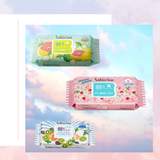5 Rules to Stay Your Home Organized During Quarantine
Posted on April 30 2020

Is the mess in your home adding to the general pool of anxiety? We have a new writer, who is a perfect fit to share some tips on how to stay-at-home less stressful. I would like to introduce you to Olga. Olga is a stay-at-home-mom (SAHM) with two boys, who recently joined our team! We are so excited to get a more diverse perspective on beauty from a stay-at-home-mom’s point of view. Since she is keen on skincare and fitness, we can look forward to articles on those topics as well. Alright, now let’s get back to the main topic. With the social distancing and quarantine, we are all spending more time at home than ever. This means that it is important to keep things organized, so nothing adds on to the stress. I sure need some tips on that. Olga says, “I can help”. Here are some notes from a stay-at-home-mom (SAHM).
***
There are two types of homes run by two types of people. The first home is run by a Type-A-germaphobe who worries more about the logistics of loading a dishwasher than they do about the global pandemic we are all in. The second type of home is run by a person who is just trying to adjust to a new normal, where schedules are upside down and each room and living space is suddenly being used 24 hours a day. This article is for the second type of home being run by the second type of person.
As a SAHM, I have kept these 5 simple rules that I’ve followed for years and have been able to carry into COVID-19. Guess what? They’re still working. They work because in a world of chaos every SAHM knows this simple truth, appreciate the small things within your control. These five things are within your control.

1. Storing, Decluttering, and Junk Drawers.
Do we really need so many things?
Remember last year when Marie Kondo was all the rage? We took our extra toilet paper for granted because it didn’t bring us joy. 2020 is a very different time. You should be storing things that won’t be readily available if/when convenience stores close completely, or if your general sanity is more important than the Costco lines. Here are the things we should be storing, and the things we should be getting rid of.
Keeping: dry goods (canned foods, pasta, rice, beans, spices, and seasoning), cleaning products (liquid refills, dry cleaning rags, soap in concentrate form, bleach - at least one jug), paper products (toilet paper - obviously - and at least one package of paper towels - consider using rags instead).
Tossing/Donating: Clothes (this is the perfect time to donate - please wash everything before donating), extra linens (you won’t have extra guests coming over anytime soon), older towels (towels you were keeping for those guests), also - your tchotchkes have to go. You will be amazed at how much easier it is to clean and declutter surfaces and countertops when small trinkets, keepsakes, and tchotchkes are tossed. It’s easier to do this when you ask yourself how much emotional value that item really has.
"The question of what you want to own is actually the question of how you want to live your life."
In general, ask yourself these questions. What will my family need to survive a complete shutdown of goods and services? Do we need two boxes of toothpicks? Do we need three hundred rubber bands? Maybe? Consider that these items are technically paying rent (rent in space). How much rent and how long will they be able to pay it?
I’m not suggesting that we toss everything we learned from Marie Kondo as irrelevant now, I’m suggesting that we take her advice and apply it through the lens of COVID-19. What will we need in the immediate future? How important will those needs be?
2. Laundry Baskets Are For Storing

When the kids were attending pre-school every day, and your significant other went to work every day, the laundry baskets served a purpose. Gathering the smelly, dirty clothes and throwing them into baskets to be removed later, was somewhat convenient. Now that everyone is home, get rid of the baskets altogether. This means that when something is dirty, you pick it up and carry it into the washer - every single time. I know what you’re thinking - that’s a lot of laundries. Yes, but simply - and bluntly - staying on top of laundry means doing it daily.
If you’re lucky enough to own a weight-sensitive washer, then waiting until you have a complete load is not something that you have to worry about. But if your washer is older and doesn't have that feature, there are always things that need washing. Do you use couch covers? How many times a week are you tossing those bathroom matts into the washer? What about your sheets? Towels?
Here is a quick routine to adopt: pick up little Cindy-who’s dirty clothes, walk over to the washer and toss it with one of the items mentioned above. Because, as the details of COVID-19 continue to unravel, washing your sheets and bathroom matts on a frequent basis just makes more sense.
In short, get of rid of those laundry baskets and get used to washing in the morning, folding in the afternoon, and hanging back in closets before bedtime.
Is this frightening emotionally? Let’s move on to dishes.

3. Dishes, Dishwashers, and Garbage Disposals, Oh My.
I suggest splitting the dishes and general cleanliness of your kitchen by percentage - based on age. Two grown adults should be splitting the responsibilities down the center (50/50), yes, but your kids can clean up after themselves as well. Toddlers can use dishrags to pick up spills (even if you have to follow behind them to get it done right), and they can carry their plates to the sink. This means drilling into them after every meal (parenting is so hard) but it’s worth it! One day, they’ll do it without you having to ask and you’ll be so proud.
Now, when I say that two adults should split things 50/50, I don’t mean 50/50 at random. I mean, decide what you care about and do those things individually. If your significant other really cares about their knife set, their pots, and pans, or BBQ cutting board obsession, then they should be taking care of those things. If you really care about decluttering surfaces, wiping down counters and maintaining a clean (and ready to use) dishwasher, do that.
What if you don’t care? I know you do. You’re reading this article.

Let’s look at the general rule, that if one person cooks, the other should clean. With the virus keeping all of us home, the new rule should be, the person cooking should clean while cooking. That means, keeping counters and surfaces clean while you slice and dice. That means, keeping food scraps in compost bins empty enough to refill while you cook. That means, cleaning up spills from pots while the fire is still on.
The person who has just enjoyed the food should clean up the dishes used to eat that food and the food scraps that have fallen on the floor (unless you have a dog - lucky you!) because of sloppy toddlers. This second person should also unload and reload the dishwasher. This second person should keep the kitchen clean throughout the day so that the first person is just cleaning the mess they’re making while cooking. Makes sense - right?
These rules work if you can manage being honest with yourselves about what it is that you care about. Simple as that. For example; I never volunteer to clean the slow cooker (I have my reasons); and my husband always leaves dishes ‘soaking’, and while those quirks might read as annoying, we’ve figured out a way to supplement each other's habits in the kitchen. Especially now, during these special circumstances, these are not things worth fighting about.
Feeling emotionally drained? Let’s talk about the floors.
4. Hardwood Floors? Carpets? Let’s Talk About The Tools
If your home is split between, linoleum (mine -yikes!), carpeting, and hardwood floors, then you’ll need the following tools to keep everything in order. A Swiffer-like product, a regular broom and dustpan, and a vacuum that goes over both hardwood and carpets.
Swiffer’s (or similar products) are perfect for quick linoleum and hardwood floors. I know what you’re thinking... How do you use a Swiffer when everyone is still walking around the house? Quick tip, while using the Swiffer follow behind with dry dish rags on each foot - cleaning and drying all at once. The floors get cleaned and dried enough so that no one takes a spill. (Another quick tip- you don’t have to use the plastic disposable attachments that come with Swiffer’s. The wand will grip onto a damp dishrag just the same) It’s weird, but it works!
Moving on.
Don’t vacuum daily. You simply can’t do everything daily. But do use the hose from that vacuum for obvious things like goldfish, and after that glue and noodle project, you tried this week when homeschooling was still feasible.
The general rule for your floors should be this: if you spill it or drop it, pick it up immediately. The cleaning lady it’s coming.

5. Food Management and Labels Matter.
Food matters, labels matter - and they always have, however now they can make or break your routine and hurt your health when not appropriately addressed - especially now.
For instance, fruit left on counters shouldn’t be left as decoration. Every time your kids reach for a cookie - cut them an apple. As soon as you see a fruit fly or general nastiness - it’s over for the fruit. It’s horrible. It’s sad. But the fruit must go. Also, leftovers stored in the refrigerator, should only be there for 1-2 days. It’s sad. It’s a horrible waste, but if you haven’t eaten it and it’s just being stored, it has to go. The more you do this, the more the cliché, want not - waste not, comes into focus.
How about those jars, bottles, and condiments in your refrigerator? They’re paying rent in space. They also come with convenient expiration dates that you should be reading and using. If your ketchup bottle has been in your refrigerator for more than a year - toss it.
Wasting food is sinful, yes, but so is getting sick because of bad products that you’re keeping for too long.
Let’s take a note from our favorite ice-princess, Elsa, and let it go!

If you haven't read all of these paragraphs in full, and you’ve scrolled to the bottom of this article for a quick (quicker) guide, here goes.
Daily To-Do’s: declutter surfaces, laundry, dishes, spills/stains, trash/compost, and generally making sure everything is in its place. If an item doesn’t have a home, can you get rid of it?
Weekly To-Do’s: get rid of tchotchkes/trinkets/keepsakes, go through your closets and donate items. One important thing to note is that your weekly-to-do should surround your city-trash pick-up - because that just makes sense.
Monthly To-Do’s: Deep clean everything. Bathroom, floors, and windows. Sorry, but it has to get done.
Weekend To-Do’s: Declutter your yard (if you have one), balcony, and window seals.
Above all else, and more importantly than anything else I’ve said in this article, your mental health is paramount. If you’re overwhelmed at the site of your home and the clutter, try doing the things I’ve listed above as a type of therapy. Avoidance might feel like an emotional license you can take right now, and by all means, take it! Take care of yourself first! Eventually though, the mess will only get worse and your emotional wellbeing will pay a price. Doing a little bit each day is your best bet.
***
So, how are you all feeling now after reading all these tips? It might sound overwhelming at first but if you go through these one by one, I am sure it will make you feel a lot better. As mentioned in the paragraph above, some find it therapeutic to clean and declutter. They say clear space = clear mind, and I cannot agree with it more! I usually get really distracted when I start cleaning, because I find so many things that are so nostalgic, and end up looking through them. Perhaps that’ll help us pass time during quarantine too! Let’s all stay home and avoid the spread, to end this situation as soon as possible.
P.S. If you're a bigger procrastinator than the regular Joe, watch one episode of Hoarders. That’ll help.
To find out more, visit our websites and explore our Blog more!

Olga Rosales Salinas
She writes about her passions; health, fitness, family and skincare. She loves Japanese products specifically because they promote holistic health and beauty lifestyles.



